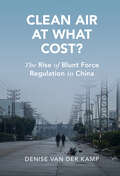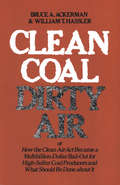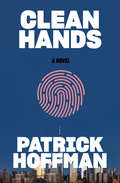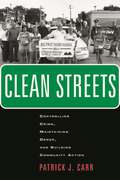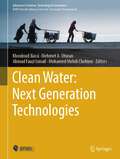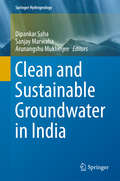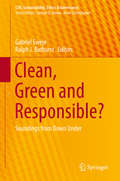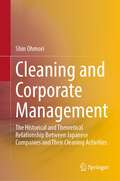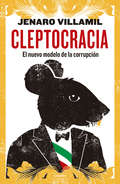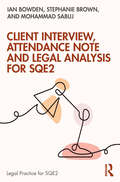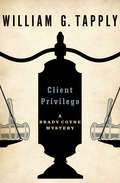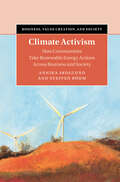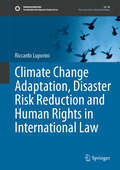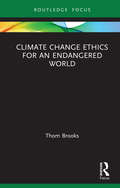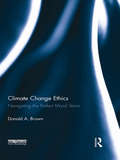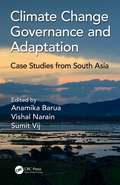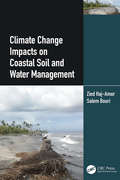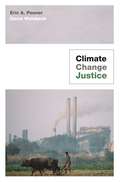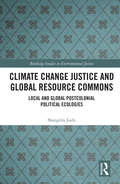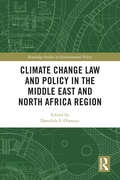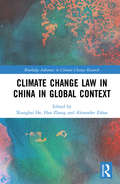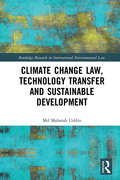- Table View
- List View
Clean Air at What Cost?: The Rise of Blunt Force Regulation in China (Cambridge Studies in Law and Society)
by Denise Sienli van der KampChina's green transition is often perceived as a lesson in authoritarian efficiency. In just a few years, the state managed to improve air quality, contain dissent, and restructure local industry. Much of this was achieved through top-down, 'blunt force' solutions, such as forcibly shuttering or destroying polluting factories. This book argues that China's blunt force regulation is actually a sign of weak state capacity and ineffective bureaucratic control. Integrating case studies with quantitative evidence, it shows how widespread industry shutdowns are used, not to scare polluters into respecting pollution standards, but to scare bureaucrats into respecting central orders. These measures have improved air quality in almost all Chinese cities, but at immense social and economic cost. This book delves into the negotiations, trade-offs, and day-to-day battles of local pollution enforcement to explain why governments employ such costly measures, and what this reveals about a state's powers to govern society.
Clean Coal/Dirty Air
by Bruce Ackerman William T. HasslerA path-breaking effort in constitutional theory which brings a new clarity to the interpretation of the Fifth Amendment's just compensation clause. Essential reading for lawyers concerned with environmental regulation or the general development of constitutional doctrine.
Clean Hands: A Novel
by Patrick HoffmanA New York Times Book Review Summer Thriller Pick. &“Keep your eye on Patrick Hoffman—he&’s got the right stuff.&”—James Carlos Blake Corporate lawyer Elizabeth Carlyle is under a lot of pressure. Her prestigious New York law firm is working on the most high-stakes case in company history, defending a prominent bank. When Elizabeth gets the news that one of her junior associates has lost his phone—and the secret documents that were on it—she needs help. Badly. Enter ex-CIA officer Valencia Walker, a high-priced fixer who gets called in when governments, corporations, and plutocrats need their problems solved discretely. But things get complicated when the missing phone is retrieved: somebody has already copied the documents, and now they&’re blackmailing the firm. When the situation gets murkier still—hinting that darker forces may be churning below the surface—Elizabeth and Valencia must maneuver and outmaneuver whomever is behind this, and, most importantly, keep their hands clean. This is a world of private security, private diplomacy, and private justice. A sharply drawn cast of characters—dirty lawyers, black-market traders, Russian criminals, and extra-judicial actors, all take part in this breakneck tour through New York. Authentic, tense, and impossible to put down, Clean Hands gives a vivid look at the connections between corporations, government, and the underworld. &“It becomes increasingly clear that the whole thing is far more complicated, with much higher stakes, than most of the pawns in this grand chess game understand. The fun is in the details.&”—The New York Times Book Review
Clean Power Politics
by Joseph P. TomainThe United States has been experiencing an energy transition for over four decades, and now - thanks to the Clean Power Plan of the Obama Administration and the Paris climate agreement - a clean energy future is moving closer to reality. In Clean Power Politics, Joseph Tomain describes how clean energy policies have been developed and, more importantly, what's necessary for a successful transition to a clean energy future, including technological innovation, new business models, and regulatory reforms. The energy system of the future will minimize the environmental costs of traditional energy production and consumption, and emphasize expanded use of natural resources and energy efficiency. Because many new energy technologies can be produced and consumed at smaller scales, they will shift decision-making power away from traditional utilities and empower consumers to make energy choices about consumption and price. In this way, a clean energy future embodies a democratization of energy.
Clean Streets: Controlling Crime, Maintaining Order, and Building Community Activism (New Perspectives in Crime, Deviance, and Law #8)
by Patrick J. CarrWith the close proximity of gangs and the easy access to drugs, keeping urban neighborhoods safe from crime has long been a central concern for residents. In Clean Streets, Patrick Carr draws on five years of research in a white, working-class community on Chicago’s South side to see how they tried to keep their streets safe. Carr details the singular event for this community and the resulting rise of community activism: the shootings of two local teenage girls outside of an elementary school by area gang members. As in many communities struck by similar violence, the shootings led to profound changes in the community's relationship to crime prevention. Notably, their civic activism has proved successful and, years after the shooting, community involvement remains strong.Carr mines this story of an awakened neighborhood for unique insights, contributing a new perspective to the national debate on community policing, civic activism, and the nature of social control. Clean Streets offers an important story of one community's struggle to confront crime and to keep their homes safe. Their actions can be seen as a model for how other communities can face up to similarly difficult problems.
Clean Water: Next Generation Technologies (Advances in Science, Technology & Innovation)
by Ahmad Fauzi Ismail Mohamed Mehdi Chehimi Mehmet A. Oturan Khouloud JlassiThis book summarises the recent, and future, sustainable, low-cost, environment-friendly and efficient systems for clean water production, to solve clean water crisis. We cover production of water the dew and rain or via desalination, Fenton processes or electrocoagulation; nanomaterial-based water purification methods including adsorption, catalysis, smart-sensors for pollutants detection and removal. We also cover environmental management, environmental policy aspects, and review recent patents and industrial processes to produce clean water. Written by experts in the domain of wastewater treatment, production of clean water and environmental management, this new book will be a unique tool for experts and students. We anticipate it open new horizons in clean water production and will be a source of inspiration for next generations of clean water technologies researchers
Clean and Sustainable Groundwater in India (Springer Hydrogeology)
by Dipankar Saha Sanjay Marwaha Arunangshu MukherjeeThe book embodies the groundwater issues and challenges in India focusing its sustainable use. It is a compilation of papers presented by the eminent experts from Government departments, academia, research institutes, NGOs and stakeholders who assembled at Kurukshetra on 21st August, 2015 in the event of Bhujal Manthan or "Churning of Groundwater" organized for the first time by Ministry of Water Resources, River Development and Ganga Rejuvenation, the apex Ministry of Water Resource under Government of India. India, as a country, is the highest groundwater extractor in the world. Its service towards attaining the food and clean drinking water security is well documented. This volume addresses the issues of aquifer characterization, groundwater contamination, groundwater resource availability and its sustainable management through community participation in pan-India scenario. This book provides a unique opportunity for its readers to understand groundwater domain in India in its entire gamut. The papers included in the volume were selected carefully from the presentations made in the following four broad topics during the Manthan; (i) groundwater quality, (ii) conjunctive use of surface and groundwater, (iii) management intervention and sustainable use of this resource, and (iv) groundwater problems and application of various techniques. The book contains 20 papers including an introductory chapter by the editors. The content of the book is enriched by contributions from eminent researchers and activists in groundwater domain, like Prof. Tushar Shah, Prof. Himanshu Kulkarni, Dr. D. K. Chadha, Dr. Bharat Sharma and others. The recommendations in the individual papers are of immense significance for keeping the groundwater of the country clean and sustainable. The volume will help the readers to understand the groundwater issues of the country and also assist policy makers to prepare strategies for its better governance and management with environmentally sustainable ways.
Clean, Green and Responsible?: Soundings from Down Under (CSR, Sustainability, Ethics & Governance)
by Gabriel Eweje Ralph J. BathurstNew Zealand and Australia are broadly considered to be countries in which sustainability and responsibility discourses are being pursued by governments and business alike, and in which incentives and initiatives are helping confront and overcome sustainability-related challenges. This book takes a closer look behind and beyond the marketing mantras of both Australia’s and New Zealand’s “clean and green” campaigns and, on the basis of representative examples and cases, critically evaluates the status quo.The book assesses the effectiveness of sustainability and responsibility models with a focus on the South Pacific and argues that the ways in which issues have been dealt with in this more closely defined geographical region are most likely a good indicator of how similar issues are (or soon will be) dealt with around the globe. As such, the book offers a rich source of cases on sustainability and responsibility in the business arena, a critical review, and an inspirational affirmation of responsible business practice.
Cleaning and Corporate Management: The Historical and Theoretical Relationship Between Japanese Companies and Their Cleaning Activities
by Shin OhmoriThis book provides a new way of understanding Japanese management by focusing on the relationship between Japanese companies and their social practices. Whereas previous studies have often concentrated on the uniqueness of Japanese companies' systems (e.g., lifetime employment, the seniority system, company-specific unions) or methods (e.g., bottom-up management, Toyota production methods), this book explains the uniqueness of Japanese companies’ activities and practices. It especially highlights the day-to-day cleaning activities that many companies have practiced for numbers of years, regardless of their size or industry. Activities that continue beyond a certain period of time are called social practices, and the book clarifies how this particular social practice has historically been formed in Japanese companies and then shows what it means to keep cherishing those cleaning practices. This study consists of two parts: historical research and theoretical research. The historical research sheds light on the relationship between Japanese companies and cleaning activities from a historical point of view. On the basis of old literature and in-house documents, the reader can understand how Japanese companies have positioned cleaning practices in the process of increasing their growth potential and competitiveness and in maintaining their businesses. The second part explains theoretically the relationship between cleaning and management with quantitative and qualitative data from Japanese companies today. Using survey results from Japanese companies, the book shows what kinds of organizations will be formed and human resources will be developed if companies have been focusing for many years on 5S activities—Sort, Set in Order, Shine, Standardize, and Sustain— that include cleaning. This part of the book presents the distinctive problem-solving and strategy-creation processes of Japanese companies in contrast to the activities of European and American companies.
Clear and Convincing Proof
by Kate WilhelmThe Kelso/McIvey rehab center is a place of hope and healing for its patients--and for the dedicated staff who volunteer there. But David McIvey, a brilliant surgeon whose ego rivals his skill with a scalpel, wants to change all that. His plan to close the clinic and replace it with a massive new surgery center--with himself at the helm--means that the rehab center will be forced to close its doors.Since he is poised to desecrate the dreams of so many, it's not surprising to anyone, especially Oregon lawyer Barbara Holloway, that somebody dares to stop him in cold blood. When David McIvey is murdered outside the clinic's doors early one morning, Barbara once again uses her razor-sharp instincts and take-no-prisoners attitude to create a defense for the two members of the clinic who stand accused. And in her most perplexing case yet, Barbara is forced to explore the darkest places where people can hide--the soul beneath the skin.
Cleptocracia: El nuevo modelo de la corrupción
by Jenaro VillamilESTÁBAMOS A UN PASO DEL ABISMO...Y DIMOS UN PASO ADELANTE. Esta frase, atribuida a decenas de políticos, se convirtió en realidad: en México, la corrupción era ya catastrófica, y empeoró. "A diferencia de la mafia del poder, el término cleptocracia define una dinámica distinta: es la institucionalización del robo. La mafia del poder es descriptiva, la cleptocracia es prescriptiva. La mafia del poder captura al Estado, la cleptocracia se vuelve el Estado. La cleptocracia, a diferencia de la mafia, transforma lo que son bienes públicos en bienes privados. La corrupción en la cleptocracia no es la excepción, sino la regla, y no es una práctica ajena a la institucionalidad sino el hecho que explica su funcionamiento." -Jenaro Villamil/Introducción
Cleveland Police (Images of America)
by Cleveland Police Historical Society MuseumWhen Cleveland, Ohio, was incorporated as a city on March 5, 1836, the population numbered less than 6,000. In its heyday, the city was touted as the "Sixth City" when the population soared to 560,663. Today, the Cleveland Division of Police serves and protects 478,403 souls. Over the years, the division has been a pioneer in many aspects of policing, including criminal identification, scientific investigation, and communications. In the 1920s and 1930s, Cleveland had one of the most progressive and efficient departments in the country. The first use of a surveillance camera to identify bank robbers, which led to their quick arrest, occurred in Cleveland on April 12, 1957. However, the job of protecting and serving the people has never been easy--to date, 107 Cleveland police officers have died in the line of duty.
Client Interview, Attendance Note and Legal Analysis for SQE2 (The Skills of Legal Practice Series for SQE2)
by Stephanie Brown Mohammad Sabuj Ian BowdenClient Interview, Attendance Note and Legal Analysis for SQE2 is the latest title in a new series of books aimed at those preparing for SQE2, providing a comprehensive overview of everything you need to successfully pass the SQE2 advocacy assessment.This book explains the key principles of oral communication, interview technique, and legal analysis in a clear, concise, and easy-to-understand style. The use of practical examples, from the practice areas set out by the SRA assessment specification, allows such key principles to be effectively introduced and illustrated. The book demonstrates the importance of the three key tenets of listening, questioning, and advising, with a view to ensuring that a matter can be analysed effectively, and effective and appropriate decisions can be made. The book provides a clear and structured approach, with opportunities to apply the relevant principles to the law. Chapters include summaries, key practice cases, practice tips, and exercises to reinforce learning and understanding.Written by an author team with extensive experience in teaching and practice, this unique book will be essential reading for any candidate wishing to be fully prepared for their SQE2 assessment.
Client Privilege (The Brady Coyne Mysteries #9)
by William G. TapplyWhen someone tries to blackmail an old friend, Boston attorney Brady Coyne intervenes—only to wind up a murder suspect in this &“solidly appealing series&” (Publishers Weekly). Brady Coyne has known Chester &“Pops&” Popowski since law school. An honest, battle-hardened Massachusetts judge, Pops is more soldier than scholar—and has been known to defend what&’s right with his fists. After years on the bench, Pops has been nominated for a federal judgeship, with a possible Supreme Court appointment in his future. Only one thing stands in his way: blackmail. A TV reporter has evidence of a long-ago affair Pops conducted with a younger woman. Pops sends Brady, his genteel Boston lawyer, to tell the reporter he won&’t be getting any money. Soon after their meeting, the blackmailer is found dead. Brady refuses to name his client, and finds himself under suspicion of murder. Brady will do whatever it takes to keep Pops out of the papers. If he&’s lucky, he may even keep himself out of jail.
Climate Activism: How Communities Take Renewable Energy Actions Across Business and Society (Business, Value Creation, and Society)
by Steffen Böhm Annika SkoglundWhat is activism? The answer is, typically, that it is a form of opposition, often expressed on the streets. Skoglund and Böhm argue differently. They identify forms of 'insider activism' within corporations, state agencies and villages, showing how people seek to transform society by working within the system, rather than outright opposing it. Using extensive empirical data, Skoglund and Böhm analyze the transformation of climate activism in a rapidly changing political landscape, arguing that it is time to think beyond the tensions between activism and enterprise. They trace the everyday renewable energy actions of a growing 'epistemic community' of climate activists who are dispersed across organizational boundaries and domains. This book is testament to a new way of understanding activism as an organizational force that brings about the transition towards sustainability across business and society and is of interest to social science scholars of business, renewable energy and sustainable development.
Climate Change Adaptation, Disaster Risk Reduction and Human Rights in International Law (Sustainable Development Goals Series)
by Riccardo LuporiniClimate change poses an escalating challenge to global society, with climate-related disasters becoming more frequent, severe and widespread in their impact on individuals and communities, and in their interference with human rights. To confront this challenge, States must not only mitigate climate change by reducing greenhouse gas emissions but also adopt comprehensive measures to adapt to its effects and manage climate change-related disaster risk. This book provides an in-depth analysis of the international legal frameworks governing climate change adaptation and disaster risk reduction, focusing on the critical role of human rights in strengthening these frameworks and ensuring their implementation. The study explores the extent to which human rights have been integrated into international climate change and disaster law, examines how climate change-related disaster risk is addressed within international human rights law, and assesses the growing trend of human rights-based climate change and disaster litigation and its potential regulatory impact. The book offers a unique perspective on international lawmaking in the fields of climate change and disaster management while also shedding light on the ongoing development of human rights law as it seeks to address the unprecedented threats posed by climate change and its associated risks.
Climate Change Ethics for an Endangered World (Routledge Focus on Environment and Sustainability)
by Thom BrooksClimate change confronts us with our most pressing challenges today. The global consensus is clear that human activity is mostly to blame for its harmful effects, but there is disagreement about what should be done. While no shortage of proposals from ecological footprints and the polluter pays principle to adaptation technology and economic reforms, each offers a solution – but is climate change a problem we can solve? In this provocative new book, these popular proposals for ending or overcoming the threat of climate change are shown to offer no easy escape and each rest on an important mistake. Thom Brooks argues that a future environmental catastrophe is an event we can only delay or endure, but not avoid. This raises new ethical questions about how we should think about climate change. How should we reconceive sustainability without a status quo? Why is action more urgent and necessary than previously thought? What can we do to motivate and inspire hope? Many have misunderstood the kind of problem that climate change presents – as well as the daunting challenges we must face and overcome. Climate Change Ethics for an Endangered World is a critical guide on how we can better understand the fragile world around us before it is too late. This innovative book will be of great interest to students and scholars of climate change, climate justice, environmental policy and environmental ethics.
Climate Change Ethics: Navigating the Perfect Moral Storm
by Donald A. BrownClimate change is now the biggest challenge faced by humanity worldwide and ethics is the crucial missing component in the debate about what to do about this enormous threat. This book examines why thirty-five years of discussion of human-induced warming has failed to acknowledge fundamental ethical concerns, and subjects climate change’s most important policy questions to ethical analysis. This book examines why ethical principles have failed to gain traction in policy formation and recommends specific strategies to ensure that climate change policies are consistent with ethical principles. Because climate change is a global problem that requires a global solution and given that many nations refuse participation due to perceived inequities in proposed international solutions, this book explains why ensuring that nations, sub-national governments, organizations, businesses and individuals acknowledge and respond to their ethical obligations is both an ethical and practical mandate. This book is the first of its kind to go beyond a mere account of relevant ethical questions to offer a pragmatic guide on how to make ethical principles influential in formulating the world’s response to climate change. Written by Donald A. Brown, a leading voice in the field, it should be of interest to policy makers, and those studying environmental policy, climate change policy, international relations, environmental ethics and philosophy.
Climate Change Governance and Adaptation: Case Studies from South Asia
by Anamika Barua, Vishal Narain and Sumit VijClimate change adaptation in South Asia is redefining the roles of different actors in the governance processes. The existing governance lack capacity, knowledge, and leadership skills to manage the uncertainties and challenges posed by climate change. This book aims to explain how the governance of climate change adaptation and mitigation is being shaped in the region and how climate change is impacting upon the governance of natural resources. Although the focus is on South Asia, the editors draw a wide range of contributions from northern and southern communities and across various agro-ecological contexts. Climate Change Governance and Adaptation: Case Studies from South Asia sees the changing climate not only as an environmental problem but as a societal challenge and discusses the governance challenges from an interdisciplinary social science perspective across different levels: local, state, and national. Discusses also the challenges and opportunities for increasing the resilience of the society through effective governance around climate change. A top down approach to govern climate change adaptation may not yield desired outcomes; instead the book emphasizes the need to integrate issues of equity, into climate governance and polices. The lessons learned from different cases across South Asia help readers have a better and deeper understanding of the relationships between governance and climate change. Given the diversity of themes covered, this book will appeal not only to researchers and practitioners in the climate change community, but also to those with a broader interest in governance processes.
Climate Change Impacts on Coastal Soil and Water Management
by Zied Haj-Amor Salem BouriClimate Change Impacts on Coastal Soil and Water Management discusses the latest approaches for monitoring soil and water degradation in coastal regions under current climate conditions as well as potential further changes in the future. It presents an overview of climate change impacts on soil and water resources and summarizes the adaptation of practical options and strategies to minimize the potential risks, such as land degradation, seawater intrusion, droughts, ocean acidification, etc. The book aims to promote the adoption of best practices, which can be selected and implemented according to the respective local conditions. In addition, the recommendations for specific soil and water use planning strategies to address climate change can also be incorporated into national and international development plans. Features: • Presents the general properties and analysis of soil and water resource conditions for coastal regions • Offers practical advice for adapting to climate change through case studies from diverse coastal settings around the globe • Presents information in an accessible format for practitioners in soil and water sciences, as well as for those working in related disciplines • Includes end-of-chapter summaries and homework problems Written primarily for practicing soil, water, agricultural, and environmental scientists, this book provides the latest research on soil and water resources management, soil processes and properties, and the related effects of climate change. It assesses the effectiveness of the methods currently in use and under future climate change scenarios as well.
Climate Change Justice
by Eric A. Posner David WeisbachA provocative contribution to the climate justice debateClimate change and justice are so closely associated that many people take it for granted that a global climate treaty should—indeed, must—directly address both issues together. But, in fact, this would be a serious mistake, one that, by dooming effective international limits on greenhouse gases, would actually make the world's poor and developing nations far worse off. This is the provocative and original argument of Climate Change Justice. Eric Posner and David Weisbach strongly favor both a climate change agreement and efforts to improve economic justice. But they make a powerful case that the best—and possibly only—way to get an effective climate treaty is to exclude measures designed to redistribute wealth or address historical wrongs against underdeveloped countries.In clear language, Climate Change Justice proposes four basic principles for designing the only kind of climate treaty that will work—a forward-looking agreement that requires every country to make greenhouse-gas reductions but still makes every country better off in its own view. This kind of treaty has the best chance of actually controlling climate change and improving the welfare of people around the world.
Climate Change Justice and Global Resource Commons: Local and Global Postcolonial Political Ecologies (Routledge Studies in Environmental Justice)
by Shangrila JoshiThis book examines the multiple scales at which the inequities of climate change are borne out. Shangrila Joshi engages in a multi-scalar analysis of the myriad ways in which various resource commons – predominantly atmosphere and forests – are implicated in climate governance, with a consistent emphasis throughout on the justice implications for disenfranchised communities. The book starts with an analysis of North-South inequities in responsibility, vulnerability, and capability, as evidenced in global climate treaty negotiations from Rio to Paris. It then moves on to examine the ways in which structural inequalities are built into the conceptualization and operationalization of various neoliberal climate solutions such as Reducing Emissions from Deforestation and Forest Degradation (REDD+) and the Clean Development Mechanism (CDM). Drawing on qualitative interviews conducted in Delhi, Kathmandu, and the Terai region of Nepal, participant observation at the Climate Conference in Copenhagen (COP-15), and textual analysis of official documents, the book articulates a geography of climate justice, considering how ideas of injustice pertaining to colonialism, race, Indigeneity, caste, gender, and global inequality intersect with the politics of scale. This book will be of great interest to students and scholars of environmental justice, climate justice, climate policy, political ecology, and South Asian studies.
Climate Change Law and Policy in the Middle East and North Africa Region (Routledge Studies in Environmental Policy)
by Damilola S. OlawuyiClimate Change Law and Policy in the Middle East and North Africa Region provides an in-depth and authoritative examination of the guiding principles of climate change law and policy in the MENA region. This volume introduces readers to the latest developments in the regulation of climate change across the region, including the applicable legislation, institutions, and key legal innovations in climate change financing, infrastructure development, and education. It outlines participatory and bottom-up legal strategies—focusing on transparency, accountability, gender justice, and other human rights safeguards—needed to achieve greater coherence and coordination in the design, approval, financing, and implementation of climate response projects across the region. With contributions from a range of experts in the field, the collection reflects on how MENA countries can advance existing national strategies around climate change, green economy, and low carbon futures through clear and comprehensive legislation. Taking an international and comparative approach, this book will be of great interest to students, scholars, and practitioners who work in the areas of climate change, environmental law and policy, and sustainable development, particularly in relation to the MENA region.
Climate Change Law in China in Global Context (Routledge Advances in Climate Change Research)
by Alexander Zahar Hao Zhang Xiangbai HeIn Climate Change Law in China in Global Context, seven climate change law scholars explain how the country’s legal system is gradually being mobilized to support the reduction of greenhouse gas emissions in China and achieve adaptation to climate change. There has been little English scholarship on the legal regime for climate change in China. This volume addresses this gap in the literature and focuses on recent attempts by the country to build defences against the impacts of climate change and to meet the country’s international obligations on mitigation. The authors are not only interested in China’s laws on paper; rather, the book explains how these laws are implemented and integrated in practice and sheds light on China’s current laws, laws in preparation, the changing standing of law relative to policy, and the further reforms that will be necessary in response to the 2015 Paris Agreement on Climate Change. This comprehensive and critical account of the Chinese legal system’s response to the pressures of climate change will be an important resource for scholars of international law, environmental law, and Chinese law.
Climate Change Law, Technology Transfer and Sustainable Development (Routledge Research in International Environmental Law)
by Md Mahatab UddinThis book explores the possibilities and scope of facilitating innovation and transfer of the environmentally sound technologies in the Post-Paris climate era. The possibilities to be explored by the book will first focus on the roles of the climate finance and technological cooperation mechanisms in innovation and transfer of environmentally sound technologies. Secondly, the book will focus on role of the ‘flexible mechanism’ (i.e. indirect financial mechanisms), which has been re-introduced by the Paris Agreement as ‘voluntary cooperation’ or ‘sustainable development’ mechanism in innovation and transfer of environmentally sound technologies. Thirdly, the book will contain a comparative analysis regarding efficiency of the technology transfer mechanism under global climate regime in comparison with technology transfer mechanism that exists under other multilateral environmental agreements (MEAs). In addition to the above, since the issues of trans-boundary technology transfer is also a matter of concern for international trade, the book will discuss to what extent the international trade related laws e.g. intellectual property laws, investment related laws governed by the World Trade Organizations (WTO) can play role in facilitating transfer of the environmentally sound technologies. Another important aspect that this book will cover is potential roles which private sectors can play in innovating and transferring environmentally sound technologies under above-mentioned instruments of international law. In short, this book will be based on the argument that if global climate regime and the international trade regime collaborate each other in creating enabling environment and attracting private sector to invest in the field of environmentally sound technologies, the global challenges of innovation and transfer of the environmentally sound technologies to the developing and least developed countries can be fulfilled in more efficient manner. From conceptual perspectives, discussions and analyses of the book will be made in the light of the principles of equity and common but differentiated responsibilities and respective capabilities (CBDR-RC) - two main guiding principles of the international laws on climate change. This book will be of great interest to scholars of climate change, technology transfer, intellectual property and sustainable development. Besides, national and international level policy makers dealing with climate change and sustainable development will be greatly benefitted from this book.
